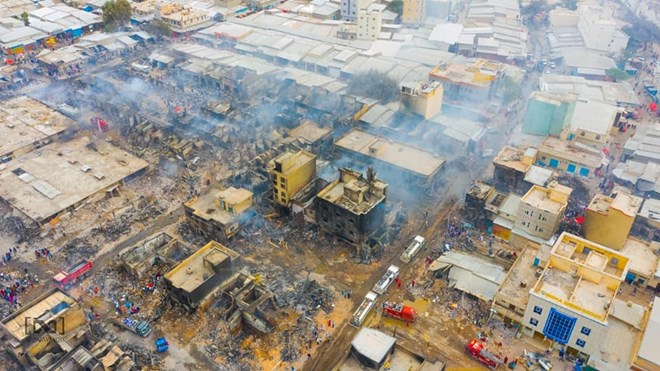
Sunday April 3, 2022

A huge fire engulfed the main market in the city of Hargeisa
in northern Somalia Saturday, injuring at least 28 people and destroying
hundreds of businesses, city authorities and witnesses said.
According to witnesses the overnight inferno started where
old warehouses are located in the sprawling Waheen market, a vibrant business
center in the city.
“The fire started from an old warehouse department and winds
spread it rapidly through the market, razing multistory buildings, tea shops,
groceries, restaurants, electronics stores and a meat market,” Sayid Karama, a
witness told VOA Somali.
Images posted on social media showed the entire market area
covered by huge flames sending columns of black smoke above the city, located
in the country's Somaliland region.
During a visit to the marketplace, Somaliland President Muse
Bihi Abdi said 28 people, nine of them women, were injured, and that no loss of
life had been reported.
Officials said those injured were mainly traders attempting
to salvage some of their wares from the burning stalls.
The cause of the fire, which some market traders blame on an
electrical fault, remains unclear.
Hargeisa's mayor, Abdikarim Ahmed Mooge, who visited the
burned-out market, said that the market's narrow streets and hundreds of
traders, who stormed to the scene hampered efforts to immediately contain the
fire by the city’s small brigade of firefighters.
"This place was the economic center of Hargeisa and
even though the firefighters did their best to contain the fire, the market is
destroyed, and this city has never witnessed such a massive calamity,"
said Mooge. “We share the pain with the traders in Hargeisa, those who lost
property in the blaze. We must show the world that we are persevered because of
a belief -- a belief that out of the ashes of such an inferno, a new recovery
could be born.”
Several store owners who spoke to VOA reported a huge loss
of property due to the fire. Somaliland authorities said a committee has been
organized to assess the financial damage.
“My government would be releasing 1 million U.S dollars to
help with the emergency response to the disaster,” President Bihi said.
The pinch of rising food prices
The market fire coincides with the first day of the Muslim holy
month of Ramadan, which begins this year with soaring prices of staple foods in
markets in Somalia and across the world.
For traders and consumers in Hargeisa, in the aftermath of
COVID-19's economic impact, Russia’s military invasion of Ukraine, and
recurring drought, the market fire means extra strain for their daytime fasting
and nighttime feasting.
“It is the beginning of Ramadan, a holy month for 1.8
billion Muslims around the world to observe with prayers, happiness and in the
hope of forgiveness and reward, but for many of us here in Hargeisa, it started
with happy and sad at the same time,” Mahad Ahmed, a trader whose family lost
five shops in the fire, told VOA.
Ramadan is the ninth month of the Islamic lunar calendar. It
started Friday and lasts for 29 to 30 days. During Ramadan, observers refrain
from eating, drinking and sex between daybreak and sunset.
Residents of Mogadishu and Addis Ababa in Ethiopia are aware
of the news of the market burnout and the burden it can bring to the local
people.
“We share the pain and the sad feeling with the people in
Hargeisa for the loss of property and wish them that Allah gives them
replacement,” said Somali President Mohamed Abdullahi Farmaajo.
“We tell the Somaliland people that we are with them in
their difficult times, and I wish them better. Indeed, to Allah we belong and
to Allah we shall return,” said Abiy Ahmed Prime Minister of Ethiopia.
In 1991, Somaliland declared its independence from Somalia,
which views it as a northern breakaway region, not a separate nation.
The two sides have held repeated rounds of talks, most
recently in June 2020 in Djibouti, when they agreed to appoint technical
committees to continue discussions. No meetings have taken place since then.
Last month, Somaliland President Muse Bihi Abdi paid a visit
to Washington, making the case that the U.S. should become the first country to
recognize his self-declared state’s independence.
In an interview with VOA Somali during his visit, Bihi said
he was leaving with some positive signals to show for it.
The U.S. State Department emphasized the Biden
administration's commitment to a unified Somalia, but also held out the
possibility of stronger ties with Somaliland.
Khadar Akulle contributed this report.